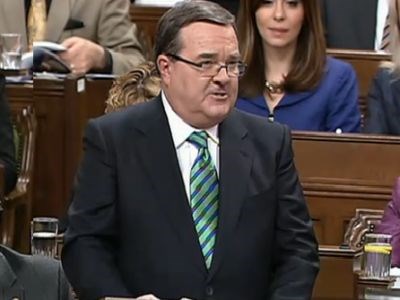With the federal deficit still at $25.9 billion, federal Finance Minister Jim Flaherty insisted March 21 the government will still be able to balance its books by 2015.
It will do so by holding off on any new major spending for now. Flaherty said the budget “contains the smallest increase in discretionary spending in nearly 20 years.”
The budget forecasts a deficit of $18.7 billion in 2013-2014, $6.6 billion in 2014-2015, a surplus of $800 million in 2015-2016 and a surplus of $3.9 billion in 2016-2017.
“The Canadian economy continues to create jobs and experience modest growth, yet we still face significant risks from beyond our borders, particularly from the euro area and the United States, our largest training partner,” Flaherty said, in a press release.
“Economic Action Plan 2013 builds on the strong foundation laid in previous years to connect Canadians with available jobs, to provide long-term, predictable funding for infrastructure, and to make significant investments in manufacturing and critical research.”
Initiatives in the budget include:
-Introducing the Canada Job Grant, which would provide $15,000 or more per person for short-term skills training. Only $5,000 of this would be provided by the federal government, with matching contributions coming from provinces and employers. The federal government is clawing back $300 million in provincial transfers to pay for its share.
-A 10-year pledge to transfer about $4.7 billion a year to municipalities for infrastructure, plus an additional $1.25 billion over five years for a federal public-private partnership fund.
-Closing what the government calls “tax loopholes.” One change in particular – a dividend tax credit change – will primarily impact small business owners and raise more than $2 billion a year. It also will stop people from doing such things as moving money offshore.
-The Canadian International Development Agency (CIDA) will be merged with the Department of Foreign Affairs and International Trade.
-Manufacturers will receive $1.4 billion over four years in tax relief to purchase new machinery and equipment.
-Tariffs will be reduced on items including baby clothing and sports equipment such as ice skates and golf clubs.
-Would-be employers will have to spend more money and time advertising jobs to Canadian workers over temporary foreign workers. There would also be user fees to bring in foreign workers.
Join Sudbury.com+
- Messages
- Post a Listing
- Your Listings
- Your Profile
- Your Subscriptions
- Your Likes
- Your Business
- Support Local News
- Payment History
Sudbury.com+ members
Already a +member?
Not a +member?
Sign up for a Sudbury.com+ account for instant access to upcoming contests, local offers, auctions and so much more.
